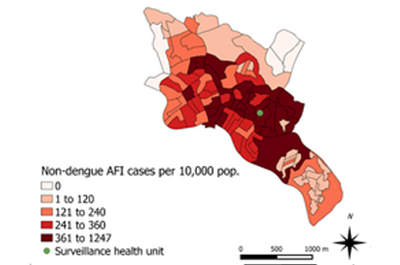
Work by BSTM-awarded researcher is published in renowned scientific magazine and grants international partnership
Plos is one of the magazines with greater impact in Tropical Medicine
13/12/2015
Publishing the article on PLOS allowed a parnership with Stanford University to expand the studies about dengue transmission in the assessed community
Granted 3rd place last August in the 2014 Young Researcher Award, PhD student Mariana Kikuti has quickly evolved in the scientific community since then. Her work – about different risk areas for dengue in the same socially vulnerable community – was published this June in the renowned magazine PLOS Neglected Tropical Diseases (NTD).
PLOS is a non-profit project that functions as a scientific magazine and related articles library in open source licence model. Monthly, nearly 2 million registered articles are downloaded from the website.
Publishing an article in such a renowned magazine as PLOS NTD is very satisfying, not only because it is one of the most impacting magazines within Tropical Medicine, but also because it is strictly sieved by academy pairs, explained Kikuti.
For her, publishing in PLOS is a great boost in a young researchers carreer. I am very happy to find all the dedicated effort – not only mine, but all those involved in the project – is now returning results, she stated.
According to the scientist, joining the Young Researcher Award contest returned a feedback of valuable contributions from the evaluators, what was certainly essential for the acceptance of the work in such a renowned magazine.
The research was conducted along with a team working in the Pau de Lima community in Salvador, BA, since 2009. The goal was to assess the places territorial unities established by the Brazilian Geography and Statistics Institute, known as census sectors. The work showed the same socially vulnerable community could have different risk areas for dengue.
Partnerships
Publishing the article in PLOS, according to Kikuti, gave the work developed in Pau de Lima a great notability. This way, we have already established partnerships with Stanford University, in the USA, to expand the studies about dengue transmission in the community we have been working, she celebrated.
Another partnership was firmed with Salvador Municipal Health Secretary, to study the locally observed phenommena in larger scale, involving the whole city. Besides this, other epidemiological studies have been conducted in the community [Pau de Lima], aiming to identify individual and household factors related to the dengue cases detected in the health unit, the disease sub-notification rate and how the use of a rapid test could impact the assistance for patients with dengue, said the scientist.
The Young Researcher Award, which had its second edition during MEDTROP 2015, credits graduate and undergraduate students, intending to stimulate the formation of new tropicalists.…










